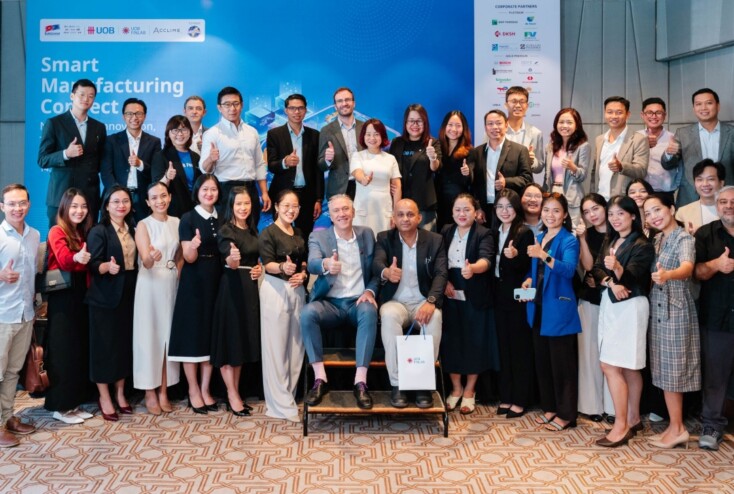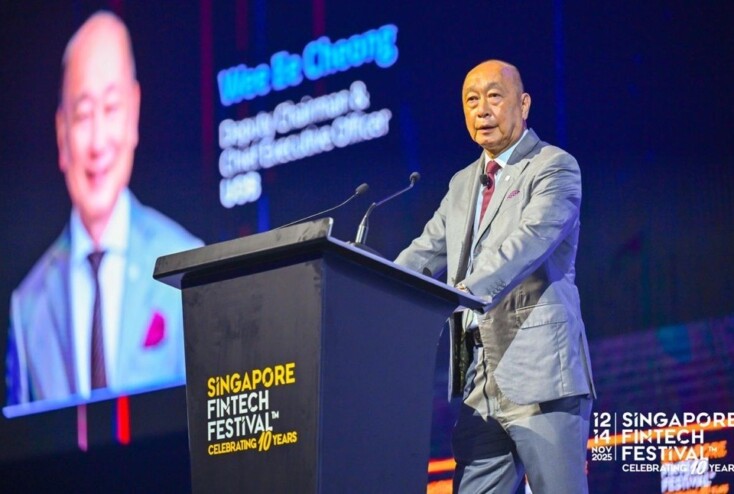
Smart Manufacturing Connect: Navigating Innovation, Trade & AI Frontiers – UOB FinLab Vietnam
UOB FinLab Vietnam: Digital Gateway to Global Markets empowered SMEs with insights and connections to scale globally with confidence.

Upskilling is no longer optional. It is a key strategy for small and medium enterprises (SMEs) to navigate business continuity, adapt to change, and stay competitive. It bridges the capability gap and ensures they stay future-ready.
In today’s business environment, AI, digitalisation and sustainability are reshaping the way we work and grow. Digital technologies like artificial intelligence (AI), data analytics, and cloud computing are now foundational to efficient, scalable, and competitive operations. Meanwhile, sustainability has moved from a corporate buzzword to a critical expectation embedded into procurement frameworks, regulatory standards, and stakeholder priorities.
These shifts offer unprecedented opportunities for growth and innovation, but also demand greater capability, compliance, and strategic agility. Inevitably, SMEs face a steeper climb as they adapt alongside larger counterparts.
SMEs make up 99% of all businesses, yet they are often the most vulnerable to disruption. The UOB Business Outlook Survey (BOS) 2025 revealed that 1 in 3 businesses are struggling with high implementation costs, cybersecurity threats, and limited digital skills amongst employees. These issues are especially pressing for SMEs, which typically operate with leaner teams and fewer financial buffers.
Sustainability pressures are equally intense. The same survey found that 41% of businesses adopt green practices to align with the sustainability goals of multinational corporations (MNCs), while 50% cite brand reputation as a key driver. Yet, many SMEs remain uncertain about where to begin or how to measure and report their sustainability progress effectively.
Digitalisation and sustainability go hand in hand. A digitally mature SME can better manage energy usage, monitor supply chain emissions, and ESG reporting. Likewise, a sustainability-focused business can leverage data and technology to scale green innovations. For instance, an SME can use digital tools such as cloud platforms to monitor electricity usage and quickly identify areas of energy waste. This helps to reduce costs and promote more environmentally sustainable operations.
This makes upskilling not just important, but essential. It bridges knowledge gaps and fuels innovation, resilience, and growth. Without the right capabilities, SMEs risk being left behind in a fast-evolving economy.
At UOB FinLab, we see upskilling as the most powerful lever for SMEs to unlock sustainable growth in a constantly changing world. We’ve worked closely alongside SMEs in Singapore and across ASEAN over the years, helping them build capabilities in digitalisation and sustainability through tailored, accessible programmes.
True transformation does not occur in isolation or through top-down mandates alone. It happens on the ground when SME owners, managers, and employees gain the knowledge and confidence to embrace change.
That’s why our initiatives are designed to be practical, targeted, and easy to adopt.
UOB FinLab’s Sustainability Innovation Programme is one of several initiatives designed to support SMEs and turn their sustainability goals into action. It helps businesses understand and implement green strategies that are tailored to their operations and industry context. The aim is to simplify sustainability through curated workshops, hands-on toolkits, and expert guidance, making it achievable even for resource-strapped SMEs.
In parallel, our Digitalisation Innovation Programme: Womenpreneur that happened earlier in the year supported women-led businesses in enhancing their digital capabilities tailored to their operational needs. Such programmes aim to close knowledge and capability gaps with hands-on, business-centric learning and expert guidance.
SMEs in our programmes benefit from UOB FinLab’s rich ecosystem of over 33,000 mentors, peers, and partners, giving them access to insights, learning opportunities, and collaborative support to fast-track their digitalisation and sustainability journey.
Many of our programmes are free or subsidised to ensure accessibility. We collaborate with national agencies to help SMEs tap into existing support schemes for talent development.
Budget 2025 marked a significant pivot towards a skills-first economy. From 2026, part-time learners will receive a monthly allowance of S$300, easing the burden for working adults who juggle work, life, and study. The newly launched SkillsFuture Workforce Development Grant brings together key funding support under one umbrella and increases job redesign co-funding to 70%.
For SMEs, the revamped SkillsFuture Enterprise Credit will work like an online wallet, which means they can offset transformation costs without having to wait for reimbursement. This is a direct response to industry feedback that SMEs need cashflow-friendly solutions to invest in their people and processes.
These recent changes represent a clear national signal: upskilling is a strategic imperative. At UOB FinLab, we are fully aligned with this direction. We are actively expanding our suite of programmes to match evolving business needs and build capacity at scale.
SMEs have a critical role in shaping a more sustainable, tech-enabled economy. By investing in skills and capabilities, they are better positioned to manage change, adopt technology, and capture more attention.
At UOB FinLab, we recognise that transformation happens when SMEs have access to the right knowledge, support and tools. That’s why we’re exploring new ways to expand access to relevant, practical upskilling to help businesses build real capabilities in digitalisation and sustainability. We aim to empower more SMEs to thrive in this ever-changing landscape by making learning accessible and relevant. Stay tuned as UOB FinLab continues to explore new initiatives to support this vision.
Stay up to date with the UOB FinLab community by following us on LinkedIn and subscribe to our newsletter.


UOB FinLab Vietnam: Digital Gateway to Global Markets empowered SMEs with insights and connections to scale globally with confidence.

Southeast Asia’s consumers are choosing sustainability—and SMEs must adapt. Green preferences are reshaping strategies, making data-driven insights critical. Analytics helps businesses understand customer priorities, make smarter sustainability decisions, and turn purpose into growth. With UOB FinLab’s programmes and community, SMEs gain the tools and networks to act and build long-term success.

At the Singapore FinTech Festival 2025, leaders explored how trust, interoperable payments, and strong governance will shape SME success in a digital economy. UOB FinLab, celebrating its own 10-year milestone, continues to empower SMEs across ASEAN with programmes and tools to scale sustainably and thrive in an interconnected future.

Designed for business owners to enhance their digital capabilities through practical learning, this programme takes businesses to the next level.
Designed for business owners to enhance their digital capabilities through practical learning, this programme takes businesses to the next level.


Bridge ideas and innovation, subscribe to the FinLab Connect now!